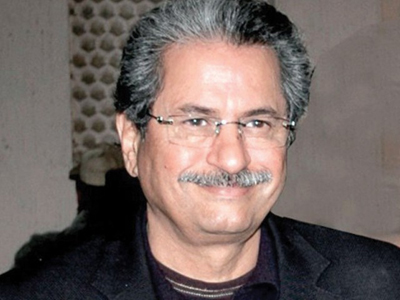ISLAMABAD ( Web News )
Federal Minister for Education and Professional Training Shafqat Mahmood while addressing First Hybrid International Conference 2021 organized by Federal College of Education and Sightsavers in Islamabad said that “Remote education is faced with multiple challenges, particularly for the disabled children amid COVID-19. However, he said, things are getting better now as the government is taking special measures to address the digital divide for the education of children in urban and rural geographies and with diverse needs”.
The two-day conference was aimed to come up with practical recommendations and solutions to get students back in schools in an enabling and safe environment. According to United Nations report, more than 91 per cent students have been affected by the schools closure. By April 2021, about 1.6 billion young students were out of schools. The school closures and the loss of family incomes kept students out of school indefinitely.
Shafqat Mahmood said that the govt is taking considerable steps for the education of children with disabilities.
He shared that various tertiary education institutions exempt candidates with disabilities from inaccessible admission tests, has relaxed age limits, providing fee concessions, and also offering appropriate examination modalities.
He also mentioned that school ‘s infrastructure would be wheelchair-friendly for physically challenged children, while sign language and braille specialist teachers should be available to cater to the needs of children with hearing and visual impairments. He said, the govt would also arrange the transcribers/writers to assist the children with visual impairment during written exams. Furthermore under the school eye health project, Federal Ministry of Education in partnership with Sightsaversis providing free eye health screening, providing free eyesight glasses, and treatment for all other complications of eye health to more than 200,000 school aged children of Islamabad.
On this occasion, Munazza Gillani, Country Director Sightsavers said that it is the need of the hour to translate inclusive education policies into actions. She said that Sightsavers has trained teachers on inclusive education of children with disabilities in the classroom, established the model inclusive technology labs at school and university level, equipped government institutions with accessible learning resources, accessible IT software and braille books for students with visual impairments. She also said that all teachers are struggling with the new normal of COVID-19, but special education teachers inparticular are facing unparalleled challenges transitioning their teaching to home-based instructions, tailored to each student’s needs.
This emphasizes the need for effective inclusive education and it is critical that all children with diverse needs have access to learning materials and technologies following the principles of Universal Design for Learning, with reasonable accommodations and differentiation.
The conference provided an excellent opportunity for exchange of good practices and international experiences for provision of hybrid learning solutions to the students during COVID-19. Furthermore, participants discussed the policy framework on hybrid learning and considered diverse range of strategies for enhancing the quality of education in Pakistan.
Moreover the conference, provided the platform for the eminent researchers and practitioners from different countries to share their work on different themes such as inclusive education for children with disabilities, specialized areas of expertise for Autistic children and teachers’ professional development to ensure provision of quality education in the country.
Sightsavers is currently working with Federal College of Education for the development of a fully credited foundational course on Inclusive Education to be integrated into the curriculum for pre-service teacher training. It has been agreed that the course will be offered as a compulsory course in FCEs bachelor’s degree programme.
Other eminent speakers who shared their expert opinions and experiences during the panel discussion were, Ms. Baela Raza Jameel (CEO ITA), Mr. Javed Malik (Country Director Malala Fund Programme), Ms. Liesbeth Roolvink (Global Technical Lead Education- Sightsavers) and Ms. Abia Akram (Chair of the National Forum of Women with Disabilities).

